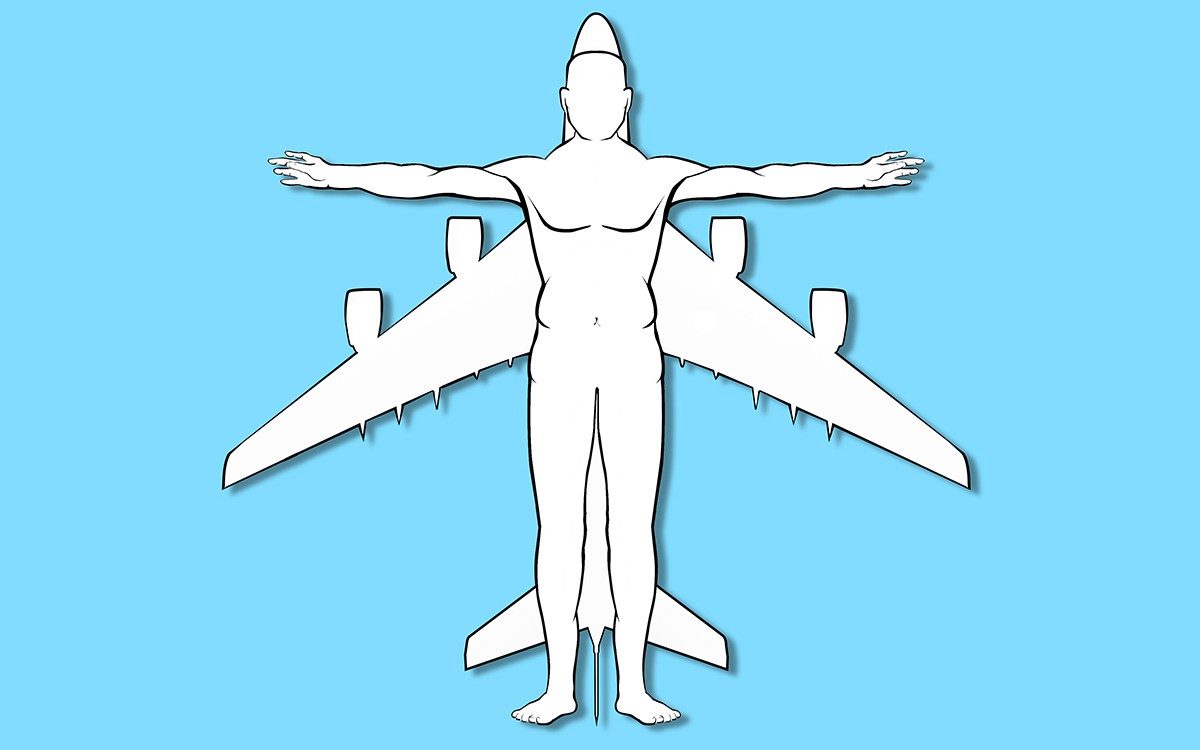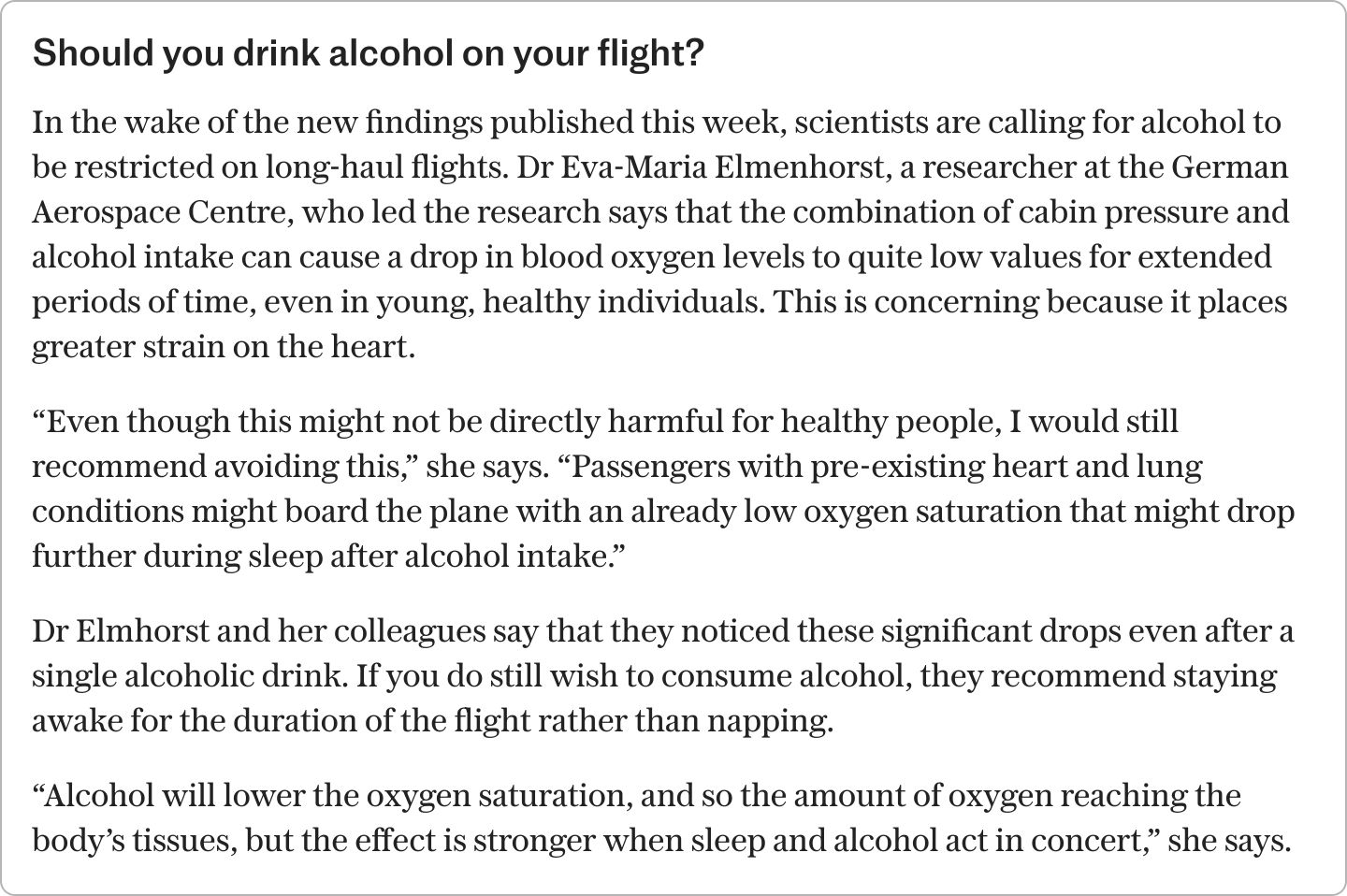
Humans are not naturally adapted to travel at high speeds in a long metal tube, so it's hardly surprising that flying has some pretty unusual effects on our bodies.
You should be careful when you are on a plane, especially if you have any pre-existing heart conditions.
Dr Stephen Hughes, a senior lecturer at Anglia Ruskin University and an emergency medicine consultant, points out that several physiological and psychological changes can occur in the body as a result of flying.
To start with, humans shouldn't be at 35,000 feet, the usual cruising height of a commercial aircraft. At this altitude, oxygen levels are so low that without the built-in cabin air pressure system, we would quickly lose consciousness. As an alternative, to enable the crew and passengers to breathe comfortably, the cabin pressurises the air to mimic the kind of pressure we would experience at around 6,000-8,000 feet, roughly halfway up Mount Blanc.
Dr Hughes is keen to stress that, in the vast majority of cases, planes are incredibly safe environments and adverse health events are extremely rare, but these diverse factors contribute to explaining why they do occasionally occur.
The more we comprehend the unusual conditions of flying, the more we can take measures to make it a more pleasant and less stressful experience for our bodies. So, from dehydration to body clocks, this is how flying affects you and what to do about it.
1. Mind
As the plane gains altitude and air pressure drops, it can result in mild levels of hypoxia, caused by a lower oxygen supply to the blood. Research indicates that this can lead to impaired cognitive functioning, memory lapses and mood swings, with an increased risk of developing negative emotions such as anxiety and tension.
Some people are more anxious when flying compared to others, which can trigger a surge in stress hormones. “It’s an unfamiliar environment where you don't have any control, so people sometimes become anxious and breathe too quickly,” Dr Hughes notes. “Your heart rate may rise, and that can be a factor that puts your heart at risk. So there's a connection between the physical and psychological effects.”
2. Ears
As you ascend into the atmosphere, the pressure of the surrounding air decreases. To compensate for this reduction, your ears 'pop' to release air from the middle ear and the sinuses.
3. Nose
Because of the fall in humidity, your eyes and nose may feel dry. This could also lead to a weakening of your sense of smell, which is why we often find ourselves craving salty foods.
4. Mouth
You might find your mouth feels dry due to the decrease in humidity. This combined with the low atmospheric pressure results in a 30% reduction in the sensitivity of your taste buds to salt and sweet flavours.
5. Stomach
As the plane takes off, many people often experience a sensation of gas expansion in the stomach, which can lead to feeling bloated or gassy. The decrease in air pressure at high altitude means there's less oxygen in the body, which can slow down the digestive process.
6. Legs
Sitting for lengthy periods of time, such as on a flight, can increase the likelihood of a blood clot forming in a deep vein, referred to as deep vein thrombosis (DVT). A World Health Organisation study demonstrated that the risk is increased by two to three times after long-haul flights lasting more than four hours and comparable modes of travel.
7. Skin
The humidity on an aeroplane is normally lower than 20 per cent compared to our usual 30 per cent at home, so your skin may feel a bit drier than it usually would.
Some passengers prefer to prepare specific lists of necessary items for certain health conditions.
Don’t get dehydrated
At high altitudes, the air has very little moisture in it, as evidenced by humidity levels typically ranging from 10 or 20 per cent. This is in stark contrast to the normal humidity levels of 35 to 65 per cent found in everyday environments.
"Obviously, passengers will lose water vapour from their breath, which indicates they are losing their entire body-water supply, and due to the extended flight duration, they can become severely dehydrated," says Dr Hughes.
Instead of drinking alcohol, Dr Matthew Goldman, a family doctor at the Cleveland Clinic, suggests aiming to drink around 250 milliliters of water per hour.

However, as Dr Rosie Godeseth, an associate medical director at Vitality, explains, there are some straightforward steps you can take to reduce the impact of dehydration and alleviate any associated discomfort.
She recommends avoiding caffeinated and high sugar drinks, which can have a similar effect to alcohol by dehydrating us. Other simple steps are to wear glasses instead of contact lenses if you wear them to ease eye discomfort, and applying a hydrating lotion or lip balm to prevent dry lips and skin.
Wash your hands often to prevent catching viruses.
Dr Godeseth explains that being in a dry environment for a while increases the likelihood of infections, as it thoroughly dries out the nasal passages.
She says, "In addition, just like any setting where we're in close proximity to others, germs spread more easily through airborne particles or by touching infected surfaces such as tray tables, seat belts, and armrests."
To reduce your risk, Dr Godeseth advises thoroughly washing your hands on the flight, endeavouring to avoid touching your face with your hands and using hand sanitiser.
Take a stroll to keep your circulation going
Becoming severely dehydrated on a flight can cause your blood to become slightly thicker, making it more prone to clotting, mainly due to the reduced amount of fluid in it.
Dr Hughes explains that spending extended periods with your legs bent can result in a decrease in blood circulation in lower limbs due to pooling and stagnation. "You're restricting the flow," he notes. "Although stretching them out may temporarily improve circulation, it's not a long-term solution. It's essential to get up from your seat from time to time, as this enables the calf muscles to push the blood back towards the heart."
Dr Goldman advises getting up, strolling about, and stretching on the hour every 60 minutes, especially when you're on a long-distance flight. "Do exercises such as ankle circles and foot pumps," he suggests. "Also, wear compression socks to keep circulation going and cut down on swelling."
Eat bananas
Most plane food comes with an extra pinch of seasoning, and one reason for this is that a third of your taste buds stop working at high altitudes, making most foods taste quite bland. Your hunger is also affected by the dry air on a plane, as this affects your sense of smell, and appetite is closely linked to being able to smell the aroma of food.
Dr Godeseth states that you're also less likely to feel hungry when you're stressed. "For some individuals, the fight or flight response can come into effect, disrupting hunger-regulating hormones like leptin," she says. "The flavour of food can also be affected as the cabin environment dulls our senses, with factors such as cabin lighting, stress, and even in-flight entertainment affecting how things taste to us."
.
Get as much daylight as possible when you arrive to reduce the possibility of disrupted sleep
.
But while there isn't always much you can do about the first two, apart from booking an airport hotel to ensure you get a bit more sleep, there are certain steps you can take to reduce the impact of flying on your body clock.
Stepping across different time zones can influence the number of enzymes available to break down our food, the efficiency of our metabolism, bowel movement patterns, heart rate, cognitive function and, naturally, sleep patterns.
She says when we travel west, for example from the UK to the United States, you're lengthening the day and so you need to slow down your body clock. "That's usually easier to do, because the clock tends to be a bit slow anyway, so people tend to find it relatively easy to stay up for a bit longer without too much sleep disruption," she says.
However, when you fly east, for example from the US back to Britain, or from Britain to Asia, you're actively speeding up your clock. "That's much harder, which is why people suffer from sleep inertia for a few days after landing, where it's hard to wake up or concentrate," Dr Winnebeck explains.
In order to counteract this, she recommends sticking to the revised time schedule as much as feasible and getting as much natural light during the day as you can because this helps reset your circadian rhythm to the new time period.
Drink plenty of water to prevent bloating and digestive problems.
Jet lag can also affect digestion for a couple of days, which is why Dr Winnebeck recommends eating meals in the new time zone, as the body's natural rhythms, which control processes in the stomach and liver, respond quickly to the timing of food intake.
.”
Dr Goldman warns that the combined effects of changes to air cabin pressure and dehydration may influence bowel movements, which occasionally lead to constipation. “My suggestions are to consider taking probiotics to support your gut microbiome,” he says. “Drinking plenty of fluid also helps to keep your gut functioning properly.”
* Consider packing a portable charger for extra power on the go
- "It's crucial to stay well-hydrated and go for light, easily digestible meals to counteract these effects and a top-notch easy snack is a banana as it is packed with high quality nutrients such as magnesium and potassium," says Dr Godeseth.
- “Aircraft cabins have a very low humidity environment, which can leave you more prone to dehydration. This in turn can make you feel rather tired and sluggish. Pressurize your hydration routine by drinking plenty of water while you're on board, and steer clear of spirits that contain caffeine or excessive sugar, as these can dehydrate you even further.”
- Because you're at risk of dehydration, apply a hydrating lotion or lip balm to prevent dry lips and skin, and wear layers you can easily take off to avoid overheating," explains Dr Godeseth. Dr Winnebeck agrees: "Dress like an onion.
- As Dr Winnebeck goes on to say, putting your hands over your eyes to prevent glare, or blocking out light with a pair of headphones, a scarf, or a beanie hat is another option.
Recommended
You're never too old to fly, but here are the health risks to think about.


Post a Comment
0Comments